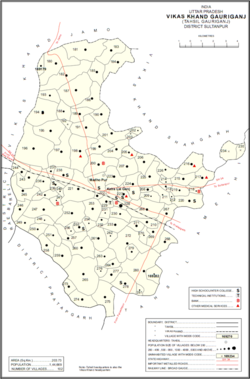Pachehri is a village in Gauriganj block of Amethi district, Uttar Pradesh, India.[2] As of 2011, it has a population of 1,403 people, in 263 households.[2] It has one primary school and no healthcare facilities and does not host a permanent market or weekly haat.[2] It belongs to the nyaya panchayat of Bahanpur.[3]
Pachehri | |
|---|---|
Village | |
 Map showing Pachehri (#253) in Gauriganj CD block | |
| Coordinates: 26°11′45″N 81°40′52″E / 26.19592°N 81.681009°E[1] | |
| Country | |
| State | Uttar Pradesh |
| Division | Faizabad division |
| District | Amethi |
| Area | |
| • Total | 2.341 km2 (0.904 sq mi) |
| Population (2011)[2] | |
| • Total | 1,403 |
| • Density | 600/km2 (1,600/sq mi) |
| Languages | |
| • Official | Hindi, Urdu |
| Time zone | UTC+5:30 (IST) |
The 1951 census recorded Pachehri (as "Pachheli") as comprising 1 hamlets, with a total population of 484 people (243 male and 241 female), in 100 households and 94 physical houses.[4] The area of the village was given as 580 acres.[4] 50 residents were literate, 49 male and 1 female.[4] The village was listed as belonging to the pargana of Amethi and the thana of Gauriganj.[4]
The 1961 census recorded Pachehri as comprising 1 hamlet, with a total population of 555 people (291 male and 264 female), in 104 households and 104 physical houses.[5] The area of the village was given as 580 acres.[5]
The 1981 census recorded Pachehri as having a population of 773 people, in 159 households, and having an area of 234.32 hectares.[6] The main staple foods were listed as wheat and rice.[6]
The 1991 census recorded Pachehri as having a total population of 1,336 people (835 male and 531 female), in 228 households and 226 physical houses.[3] The area of the village was listed as 234.00 hectares.[3] Members of the 0-6 age group numbered 168, or 12% of the total; this group was 55% male (92) and 45% female (76).[3] Members of scheduled castes numbered 377, or 27.5% of the village's total population, while no members of scheduled tribes were recorded.[3] The literacy rate of the village was 53% (519 men and 117 women, counting only people age 7 and up).[3] 331 people were classified as main workers (307 men and 24 women), while 161 people were classified as marginal workers (23 men and 138 women); the remaining 874 residents were non-workers.[3] The breakdown of main workers by employment category was as follows: 202 cultivators (i.e. people who owned or leased their own land); 60 agricultural labourers (i.e. people who worked someone else's land in return for payment); 8 workers in livestock, forestry, fishing, hunting, plantations, orchards, etc.; 0 in mining and quarrying; 2 household industry workers; 3 workers employed in other manufacturing, processing, service, and repair roles; 0 construction workers; 1 employed in trade and commerce; 0 employed in transport, storage, and communications; and 55 in other services.[3]
References
edit- ^ "Geonames Search". Do a radial search using these coordinates here.
- ^ a b c d e "Census of India 2011: Uttar Pradesh District Census Handbook - Sultanpur, Part A (Village and Town Directory)" (PDF). Census 2011 India. pp. 181–98. Retrieved 13 November 2021.
- ^ a b c d e f g h Census 1991 Series-25 Uttar Pradesh Part-XII B Village & Townwise Primary Census Abstract District Census Handbook District Sultanpur (PDF). 1992. pp. xxiv–xxviii, 116–7. Retrieved 13 November 2021.
- ^ a b c d Census of India, 1951: District Census Handbook Uttar Pradesh (49 - Sultanpur District) (PDF). Allahabad. 1955. pp. 100–1. Retrieved 13 November 2021.
{{cite book}}: CS1 maint: location missing publisher (link) - ^ a b Census 1961: District Census Handbook, Uttar Pradesh (44 - Sultanpur District) (PDF). Lucknow. 1965. pp. xl–xli. Retrieved 13 November 2021.
{{cite book}}: CS1 maint: location missing publisher (link) - ^ a b Census 1981 Uttar Pradesh: District Census Handbook Part XIII-A: Village & Town Directory, District Sultanpur (PDF). 1982. pp. 90–1. Retrieved 13 November 2021.
